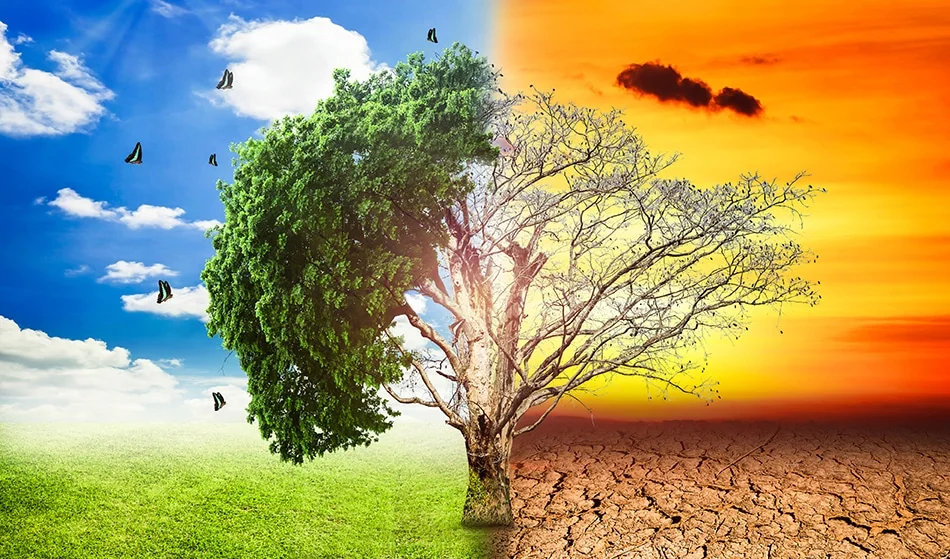
The effects of global warming are far-reaching and often startling. From changes in weather patterns to the loss of biodiversity, global warming has had a major impact on our planet. In this blog post, we’ll be taking a look at some of the lesser-known effects of global warming that you may not have heard of. We’ll discuss how global warming is affecting areas such as the ocean, land, and atmosphere, and how it’s impacting the lives of people and animals around the world.
Droughts
Ah yes, the beloved droughts! Who doesn’t love a good drought? They just bring so much joy to everyone! We get to see fields dry up, trees wilt and suffer, and watch water sources become scarce. Global warming has been kind enough to provide us with more droughts than we could ever want. It seems like every other week there’s another report of a severe drought somewhere in the world that’s causing devastating effects on people and the environment. Not only do they cause food shortages, but they can also lead to famine and disease. But hey, at least they look pretty while they destroy everything in their path!
Flooding
Global warming is a serious issue, and one of its most severe effects is the increased risk of flooding. Flooding can cause catastrophic damage to homes and businesses, as well as lead to economic losses for communities and countries. Floods are the most common natural disasters in the US. As temperatures rise, more water is evaporated into the atmosphere. This leads to more intense rainfall and storms, leading to increased risk of flooding. Global warming also affects ocean levels, resulting in coastal flooding as sea levels rise.
In addition to property damage, flooding can be extremely dangerous to humans. Flash floods can happen quickly with little warning and can be incredibly powerful, sweeping away anything in their path. People in areas prone to flooding must take extra precautions to ensure their safety.
Climate change is also affecting river basins around the world. Warmer temperatures mean earlier snowmelt, which could lead to more flooding during peak runoff periods. Changes in soil moisture can also increase the risk of flooding.
Wildfires
When you hear the word “fire” your first thought is usually one of warmth and homeyness, right? But these days, global warming has added a whole new meaning to the word “fire.” Nowadays when you hear the word “fire” you think of destruction and chaos. That’s right, I’m talking about wildfires.
The consequences of global warming on our planet are truly startling, and in many cases devastating. Wildfires not only destroy homes, land, and forests but also kill animals and people as well. In addition to that, they also produce smoke which adds to air pollution.
It’s really quite ironic that something as seemingly harmless as fire can have such a dramatic effect on our environment. So the next time you reach for the matches to light a fire, just remember that it might be having a much bigger impact than you had originally thought.
Extreme Weather Conditions
We’ve all heard about how global warming is affecting the planet, but did you know that it’s also causing extreme weather conditions? That’s right – global warming isn’t just making the temperature hotter. It’s also increasing the intensity of storms and other natural disasters like floods and droughts. With temperatures rising around the globe, we’re seeing an increase in hurricanes, tornadoes, thunderstorms, and other extreme weather events.
It’s like Mother Nature has decided to put us all on notice: “Hey, listen up! This is serious stuff. You better start taking better care of the planet before it’s too late.” But instead of paying attention, we just keep going on with our lives as if nothing is wrong. It’s almost like a big joke that no one wants to take seriously.
The truth is, these extreme weather conditions are having serious consequences. They are causing flooding, property damage, and even loss of life in some cases. And what makes matters worse is that they are becoming more frequent and more intense as temperatures continue to rise. The effects of global warming are very real, and we need to start taking steps now to stop it.
Disruption to Ecosystems
Oh boy, here we go. Ecosystems are incredibly complex, with each species playing a unique role in the system. But, of course, no one ever thought of that before global warming came along! This pesky climate change phenomenon has caused all sorts of disruption to these delicate ecosystems and it’s all thanks to us humans.
As temperatures rise and sea levels creep higher, plants, animals and other species have had to find new habitats and ways of survival. Unfortunately, the habitats they’re moving to aren’t always the best for their health or compatible with their environment. This means that these species are at risk of extinction and can no longer perform the vital functions that keep our planet healthy.
As if that wasn’t bad enough, global warming also causes increased extreme weather events which can be even more damaging to ecosystems. Wildfires, hurricanes, and floods all have devastating consequences on the environment and its inhabitants. Plus, with rising temperatures, we can expect to see more invasive species move into areas they don’t belong, further disrupting the balance of nature.
It’s clear that global warming has had a tremendous impact on ecosystems around the world and will continue to do so as temperatures continue to rise. We must act now if we want to save the planet’s delicate balance of life.
Melting Ice Sheets
It’s no secret that global warming is having a huge effect on our planet – and one of the most visible examples of this is the melting of ice sheets. Unfortunately, what some people don’t realize is that this isn’t just a problem for polar bears or climate change activists – it’s a serious problem that affects us all.
Ice sheets are large masses of ice and snow that cover vast areas in both polar regions of the Earth. For example, the Antarctic ice sheet alone covers almost 14 million km2 (5.4 million mi2) and has been around for millions of years. But due to rising global temperatures, these ice sheets have started to melt at an alarming rate, which can cause several major issues.
For starters, the melting of ice sheets means that more water is entering the oceans and increasing their levels. This can cause coastal flooding, more powerful storms, and even damage to buildings and infrastructure. It also makes it harder for cold-loving species such as polar bears, seals, and penguins to survive. And if that wasn’t bad enough, melting ice sheets also lead to a feedback loop of more warming, because less snow and ice means that the ground absorbs more sunlight instead of reflecting it back into space.
So while melting ice sheets may sound like an abstract concept, it’s actually something that can have a serious impact on our lives. It’s time to face up to this issue and do whatever we can to help reduce global warming before it’s too late!
Rising Sea Levels
The effects of global warming on our oceans and waterways are of great concern. As temperatures continue to rise, sea levels have been steadily climbing over the past few decades. This has led to devastating consequences for coastal areas, as they are increasingly at risk of flooding, storm surges, and other environmental disasters.
The rising sea levels are caused by two primary forces: thermal expansion (when water expands as it is heated) and the melting of glaciers and ice sheets. As a result of these forces, the average global sea level has increased by about 8 inches since 1880. However, some regions of the world have experienced much higher rates of increase, with some coastal cities already seeing dramatic effects.
The rising sea levels pose a real threat to those living in vulnerable areas, as well as to their local ecosystems. Low-lying islands, shorelines, and other coastal regions will be hit the hardest by the flooding and erosion caused by rising sea levels. These effects can cause extensive damage to homes, infrastructure, and property. Additionally, coastal wetlands and ecosystems will be disrupted as water inundates them, leading to the loss of habitat for many species.
It’s no wonder that the effects of rising sea levels are so concerning. The potential damage is immense, both in terms of human lives and economic cost. This is why it’s so important to act now to mitigate the effects of global warming – before the situation worsens even further.
Also read
How To Use Adobe Lightroom, Photoshop, etc for FREE on MAC
How To Use Final Cut Pro X for FREE Forever
How to use Parallels for FREE FOREVER on Macbook (M1+Intel)

